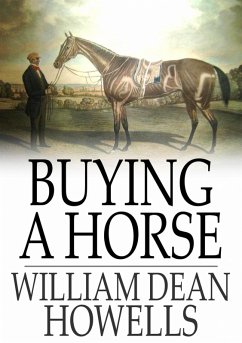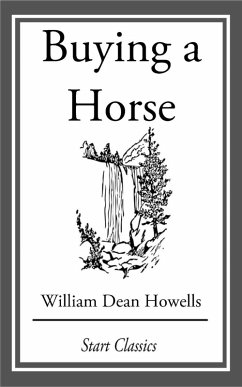
Buying a Horse (eBook, ePUB)

PAYBACK Punkte
0 °P sammeln!
In "Buying a Horse," William Dean Howells takes readers into the nuanced world of American society through the lens of a seemingly simple purchase, the acquisition of a horse. Stylistically, Howells employs a blend of realism and humor, intricately weaving social commentary with rich characterizations that reflect the complexities of late 19th-century life. The narrative captures the subtleties of class distinctions, human relationships, and the peculiarities of equestrian culture, all set against the backdrop of a society on the brink of modernization. The dialogue is sharp and insightful, sh...
In "Buying a Horse," William Dean Howells takes readers into the nuanced world of American society through the lens of a seemingly simple purchase, the acquisition of a horse. Stylistically, Howells employs a blend of realism and humor, intricately weaving social commentary with rich characterizations that reflect the complexities of late 19th-century life. The narrative captures the subtleties of class distinctions, human relationships, and the peculiarities of equestrian culture, all set against the backdrop of a society on the brink of modernization. The dialogue is sharp and insightful, showcasing Howells' mastery of vernacular speech and his ability to delve into the psychological motivations of his characters. William Dean Howells, often hailed as the "Dean of American Letters," was a pivotal figure in the realist movement. His extensive career as a novelist, critic, and editor was marked by a keen awareness of social issues, influenced by his experiences in the rapidly changing American landscape. "Buying a Horse" emerges from his deep understanding of human nature and the social dynamics of his time, reflecting the tensions between aspiration and reality. This book is highly recommended for readers interested in the intersection of humor and social critique. Howells' insights into human behavior, as well as his vivid portrayals of everyday life, offer a timeless exploration of aspiration and identity that remains relevant today. Engaging and thought-provoking, "Buying a Horse" is a delightful read for anyone who appreciates the depth of American literature.
Dieser Download kann aus rechtlichen Gründen nur mit Rechnungsadresse in A, B, BG, CY, CZ, D, DK, EW, E, FIN, F, GR, H, IRL, I, LT, L, LR, M, NL, PL, P, R, S, SLO, SK ausgeliefert werden.









